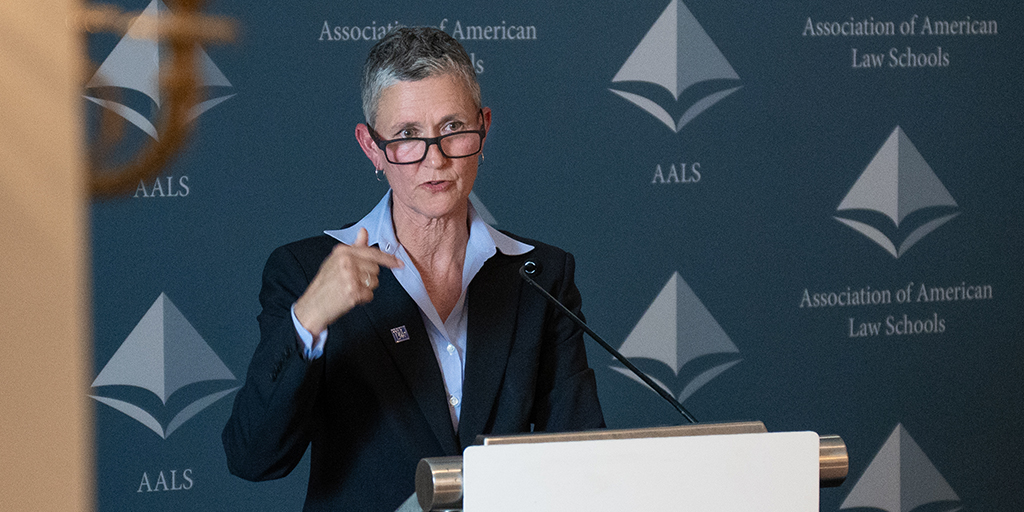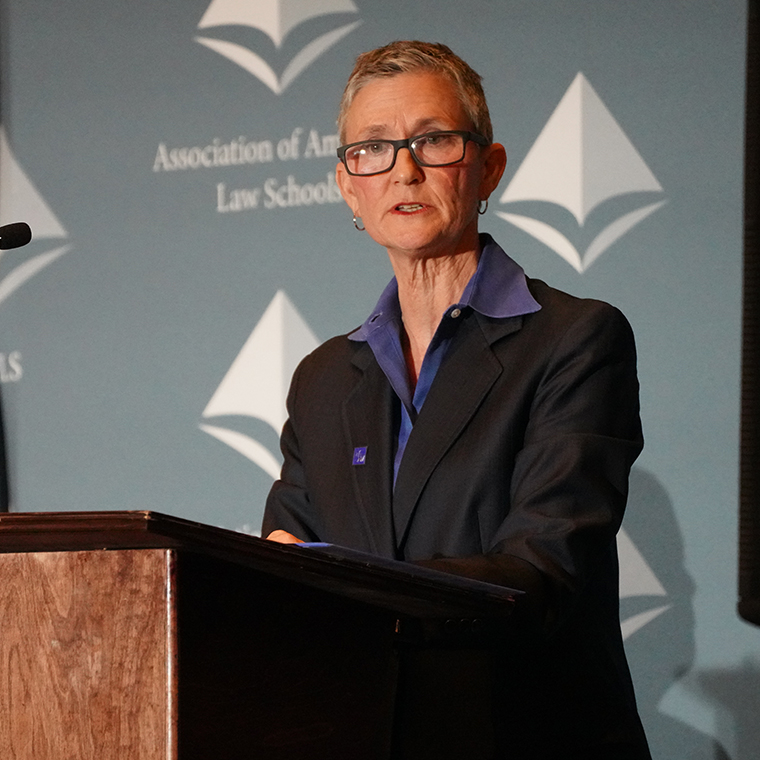Melanie Wilson, Dean and Roy L. Steinheimer, Jr., Professor of Law at Washington and Lee University School of Law, will conclude her year as AALS President at the 2025 AALS Annual Meeting in January. In advance of the meeting, Dean Wilson answered some questions about her background and vision for the association and for legal education.

Tell us a bit about your background and how you first decided to study law.
I was the first person in my family to go to college and earn a degree. My parents were always very clear that education was critical to changing the trajectory of my life, so when I graduated from the University of Georgia with a bachelor’s degree in journalism, I knew I wanted to pursue an advanced degree – either a JD or an MBA. I chose law school because I believed it kept more career options open. Thankfully, I was right. It also turned out to be a transformational learning experience. I didn’t know any lawyers before I went to law school, so I was fortunate that I selected that path. Choosing law was in large part, fortuitous. It was one of the best decisions of my life.
How did you know that you wanted to become a law professor and then a dean?
I always loved school – from kindergarten through law school. Law school challenged me in ways that prior educational opportunities didn’t. I found it rewarding as well as intellectually stimulating. When I had the opportunity to become an adjunct faculty member at Emory Law School, while I was practicing law full time, I was pleased to get involved and help subsequent generations of law students enjoy a similarly rewarding experience. Then, in my thirties, I decided that I wanted to try to make the jump from the practice of law to full-time professor. After six years in the legal academe, I was asked to become associate dean for academic affairs at the University of Kansas School of Law. At that time, I didn’t think that I wanted a leadership role, but I was happy to step in during a time of transition. I soon realized that deans and associate deans have an opportunity to impact large numbers of law students and help entire communities. My service as associate dean for academic affairs gave me the bug to lead a law school and influence policies to support faculty, students, staff, and entire communities.

You were an adjunct professor before applying for full-time teaching roles. What surprised you about the differences between being an adjunct and being a full-time professor?
As an adjunct professor, I taught a small group of students, but for those students, I had significant interaction and influence on their learning, and my teaching needed to be just as high quality as a full-time professor. But, as an adjunct faculty member, I did not have many resources of support to ensure that I was thoughtful about my pedagogy. There was also no encouragement for scholarly pursuits.
AALS now has resources specifically for adjunct professors as well as an annual virtual workshop. Is there anything that you wished you knew as an adjunct professor that you learned as a full-time professor?
As you note, in recent years, AALS has created programming for adjunct faculty and emeriti faculty in addition to continuing to enhance programming for the full range of faculty – from new law teachers through the arc of faculty careers. I wish that as an adjunct faculty member, I had been exposed to other faculty – full-time and part-time – who I could have brainstormed ideas with. Only after I became a full-time, tenure-track faculty member was I exposed to conversations about grading equity, techniques to create a syllabus that establishes an inclusive, but rigorous tone, and effective teaching techniques.
What motivated you to take on the role of AALS President?
I have been highly involved with AALS almost from the time I joined legal academia full time. I attended the Workshop for New Law School Teachers early in my career. I attended the Annual Meeting in January every year since 2007. I joined several sections early on and continued to get more and more involved. I eventually served on the nominating committee for AALS leadership and have been privileged to serve five years on the Executive Committee, including this year as President. Having spent three years on the Executive Committee before I was nominated as President-elect, I was well aware of the importance of the AALS in supporting members of the legal academic community, especially law faculty and law deans. It is extremely rewarding to serve in a leadership role for an organization that I believe in so deeply.
The theme of your presidency is “Courage in Action.” How did you choose this theme, and what does it mean to you?
I chose courage as my theme because it applies to every member and fee-paid school and every dean, faculty, and staff member within those schools. Being an effective educator has always demanded courage. Tenure is so important because it protects faculty whose research and scholarship expose unpopular, but critical, findings. With growing attacks on academic freedom and increasing pressure from state legislatures about topics that faculty should and should not teach, deans receiving threats of lawsuits, and various controversies on and across campuses, courage seemed applicable and material to everyone in legal education.
What are some of the ways the theme will be incorporated into the 2025 AALS Annual Meeting?
There will be so many programs, panels, and speakers with courage as a theme or connection. I’m particularly excited about the Presidential Program on Thursday, January 9, highlighting three extraordinary women lawyers – two from legal academia and one who holds a high-level government position. Panelists include Elizabeth B. Prelogar, the 48th Solicitor General of the United States and the second woman to hold the position, as well as Toni Massaro, the first woman to lead the University of Arizona College of Law as dean from 1999-2009, and Rebecca Hanner White, the first woman dean at the University of Georgia, serving from 2003 to 2015.
What is your leadership style, and how have you used it to implement ideas during your year as AALS president and time on the Executive Committee?
I am an adaptive and communicative leader who cares about building teams of people who support one another. But, the Executive Committee is full of accomplished leaders who are highly effective at working together for the good of the AALS. The group doesn’t take much leadership. In fact, I have never worked with a group of people who work better together. We sometimes debate concerns, and we certainly look at all sides of an issue, but in the end, the group always takes selfless action in the best interest of the AALS and its members. It has been a privilege and a joy to be an EC member and to serve as President this year.
What has been the favorite part of your year as President?
The people. I have worked with and met amazingly talented, smart, engaged, and capable people. I have worked with two legal academic icons – in Judy Areen and Kellye Testy. Judy served as Executive Director of AALS for a decade. Kellye took the position in July of this year. I have worked with extraordinary people on the Executive Committee. I have had the chance to travel to different meetings and conferences and interact with faculty, staff, judges, and community members whom I would never have met without the title of AALS President. This year has been wonderful. It’s been a tremendous professional growth year for me. I have learned so much and have found inspiration and optimism from the amazing people I have met.
What do you see as the greatest opportunity for AALS?
AALS will turn 125 in 2025. That is a testament to the organization’s value and adaptability. I look forward to seeing AALS continue to be a leader and convenor of faculty and dean talent, especially under the wise leadership of Austen Parrish who becomes the AALS President in January. AALS facilitates and creates spaces and places for faculty and others in the legal academy to come together to share the best ideas in an ever-changing and ever-challenging legal education environment. I think there is tremendous opportunity for AALS to lead – as it has for many decades.
There have been a number of changes in legal education over the last few years to better adjust to changes in the legal profession. What are some of the most significant innovations that you have seen? What other changes would you like to see?
The biggest change in legal education I have observed is the willingness and ability of law schools and specifically law faculty to prepare students better to practice law upon graduation. Not too many years ago, law schools were teaching theory and substance but not skills and practical lessons. Now most law schools do all of it really well, and they do it in a volatile law school environment. There are exceptional classroom teachers, innovative clinics and practicums and externship programs. There are opportunities for externships and pro bono work during law school. Students now emerge with a valuable degree and tremendous knowledge and skills.
What is your outlook for legal education in the next 10 years? What can law schools look forward to?
I’m bullish on legal education in the next decade. There is no educational degree that gives you more power and ability – to stand up for yourself, your clients, and your community – than a law degree. Whether you want to be your own boss and an entrepreneur or you want to change the world one cause and one client at a time, a law degree gives you the power and the chance to do that.
Anything else that we should know about you or your vision for AALS and legal education?
Legal education is in incredibly capable hands with the leadership of AALS and the law deans and their leadership teams across the country. There will, no doubt, continue to be challenges. Those challenges may intensify in the next few years. But the leaders we have in place are up for the task. They are incredibly dedicated, incredibly experienced, wickedly smart, and they are incredibly thoughtful and strategic.
